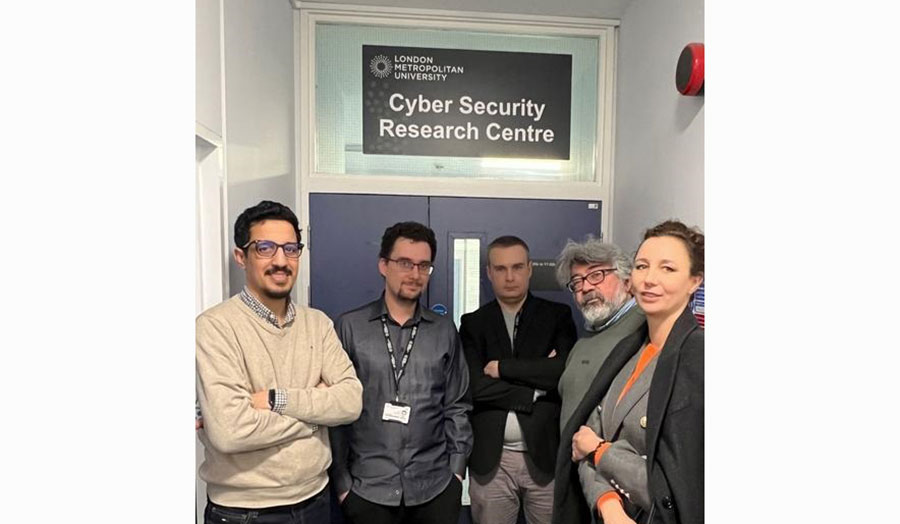Apply for this course
Please select when you would like to start:
Use the apply button to begin your application.
If you require a Student visa and wish to study a postgraduate course on a part-time basis, please read our how to apply information for international students to ensure you have all the details you need about the application process.
Why study this course?
Our Cryptography MSc course will give you the opportunity to explore a specialist area of study relating to information security that is based on mathematical theory and computer science.
The high demand for cryptography specialists in the business and technology industries offers defined and fulfilling career opportunities and facilitates entry into roles that require a master’s specialism.
Boost your career prospects
The high demand for cryptography specialists in the business and technology industries offers defined and fulfilling career opportunities and facilitates entry into roles that require a master’s specialism
Update your knowledge and improve your understanding
Whether you want to understand the potential of blockchain or examine how your identity and data is protected online, this course will give you the tools to examine and learn about information security in the digital age
Develop your transferable skills
This course is an excellent starting point if you want to have a career in developing and applying information security algorithms
Course modules
The modules listed below are for the academic year 2024/25 and represent the course modules at this time. Modules and module details (including, but not limited to, location and time) are subject to change over time.
Year modules
Applications in Cryptography and Cryptanalysis
This module currently runs:spring semester - Thursday afternoon
(core, 20 credits)
Aims of the module: what key skills and knowledge will it enable students to develop?
This module aims to introduce students to applications of cryptography in the 21st century connected, digital world. Its content and delivery is closely connected to CS7064 Information Security that students will also be studying at the same time. This companion module, taken by students on other pathways, contains a section of c4 weeks that describes key aspects of modern cryptography (focussed on asymmetric/public key algorithms). In these weeks the students taking MA7011 will encounter key concepts and definitions and the broad structure of algorithms in CS7064 but will study them in more depth and with a stronger mathematical underpinning in the corresponding sessions that form part of this module. This approach has the advantage of allowing consolidation of knowledge across two sessions in a single week for key topics of the syllabus allowing sufficient time for students to explore techniques in a lab session using MAPLE and other software.
Beyond these 4 weeks there are two other principal themes for this module:
• To give students a historical perspective on the development of cryptography and the way the subject has evolved;
• To appreciate the changing landscape that cryptography inhabits and how nascent technologies may influence its future development.
Additionally, the module aims to provide students with the background and familiarity with key concepts to enable them to make an informed selection of a topic for their major project/dissertation.
Read full detailsDiscrete Mathematical Structures
This module currently runs:autumn semester - Tuesday morning
(core, 20 credits)
This module, together with MA7010, Number Theory for Cryptography provides the essential grounding needed to complement the algorithms and techniques encountered in spring semester modules in cryptography and information security. It aims to demonstrate the theoretical underpinning that delivers security, particularly of asymmetric public key algorithms while also allowing students to appreciate the limitations and potential vulnerabilities of systems encountered elsewhere in their course. It is designed to complement, in particular, MA7011 -Applications in Cryptography and Cryptanalysis and can be taken either before or after this module depending on a student’s start point without disadvantaging them.
Techniques in discrete mathematics that have application in cryptography will be explored in a thorough way with emphasis on getting students to a level where the mathematics of cryptography and the language used is accessible to them irrespective of their background and prior study.
Beginning with a brief review of topics normally encountered in undergraduate mathematics and computer science courses, new topics will then be introduced ab initio with an emphasis on supported learning via problem classes, worked examples and formative assessment.
Read full detailsInformation Security
This module currently runs:spring semester - Thursday morning
(core, 20 credits)
The module is concerned with the study and application of tools and techniques that enable the protection of information and other resources of enterprise information systems. Increases in storage, manipulation, and transfer of data across computer networks requires effective encryption techniques. This module will provide insight into some of those techniques, algorithms and their development through history. Part of the course is dedicated to the mathematics (number theory, finite fields and elliptic curves) relevant to cryptography with techniques developed using software such as Maple. The focus will also be on the analysis, design and implementation of tools and techniques that achieve the three goals of confidentiality, integrity and authenticity in security computing. Particular focus will be on the management framework that facilitate the accomplishment of the above three goals. Importantly the module will address the ethical framework of information security, the issues around privacy and data protection and the rights of private citizens to access strong encryption. Throughout the module connections with other aspects of artificial intelligence and cybersecurity will be emphasised through the examples and case studies chosen.
Read full detailsMSc Project
This module currently runs:spring semester - Wednesday afternoon
summer studies - Wednesday afternoon
autumn semester - Wednesday afternoon
(core, 60 credits)
The module provides students with the experience of planning and bringing to fruition a major piece of individual work. Also, the module aims to encourage and reward individual inventiveness and application of effort through working on research or company/local government projects. The project is an exercise that may take a variety of forms depending on the nature of the project and the subject area. Particular students will be encouraged to carry out their projects for local companies or government departments.
The objectives of the module are:
• To develop the ability to produce detailed specification relevant to the problem of investigation.
• To manage the project by confining the problem within the constraints of time and available resources.
• To effectively research the background material on the topic using a variety of sources and to develop ability to conduct critical analysis and draw conclusions.
• To apply and/or extend the knowledge acquired in the taught core modules to a new area of application or investigation.
• To use relevant tools and techniques for designing, testing, analysing, and critical evaluation.
• To demonstrate the originality in the application of new knowledge and skills.
• To effectively communicate the work to others by verbal and documentation media.
• To raise awareness in potential business development opportunities in an area pertinent to the topic.
Number Theory for Cryptography
This module currently runs:autumn semester - Thursday afternoon
(core, 20 credits)
This module, together with MA7009, Discrete Mathematical Structures provides the essential grounding needed to complement the algorithms and techniques encountered in spring semester modules in cryptography and information security. It aims to describe relevant topics in the theory of the natural numbers that underpin much of 21st century cryptographic security. It is designed to complement, in particular, MA7011 -Applications in Cryptography and Cryptanalysis and can be taken either before or after this module depending on a student’s start point without disadvantaging them.
Additionally, this module will support a series of mini investigations designed to develop students’ ability to take the ideas they encounter, apply them with realistic datasets and draw appropriate conclusions. These will principally be delivered via procedures written in the mathematical programming language MAPLE in which students will be supported as they gain fluency but the module will also encourage students to use other languages such as Python where these are applicable to the problems being investigated.
The module will principally introduce topics in number theory but their application to cryptography will be stressed as they are introduced and in the initial weeks the module will also provide a brief overview of the subject of cryptography and its historical context.
Read full detailsCybercrime and Cyber Security
This module currently runs:autumn semester - Tuesday afternoon
(option, 20 credits)
This module provides a broad introduction to cybercrime and cyber security evolution. The module examines the relationship between advances in Internet-based and digital technologies, and their criminal exploitation within cyberspace. It examines a wide range of cyber threats, attacks and risks, and the strategies employed to mitigate these, including the laws that are in place to protect and prevent online crimes/cybercrimes.
The module provides essential coverage of the principles and concepts underpinning cybercrime and cyber security, maintaining focus on the identification, examinations and assessment of the key threats, attacks and risks, and in areas related to legal, ethical, social and professional issues.
Read full detailsFinancial Mathematics
This module currently runs:autumn semester - Wednesday afternoon
(option, 20 credits)
This module provides an introduction to some of the key mathematical methods used in financial calculations and how they are applied to the valuation of projects in the presence of uncertainty. There will be a particular focus on Discounted Cash Flow and Real Options methods but also on recent developments in the field of project valuation.
Methods such as Monte-Carlo simulation for financial options valuation and the Capital Asset Pricing Model (CAPM) with the aim of optimising a portfolio will also be explored using real financial data.
The module aims to:
1. Provide students with a set of up-to-date mathematical tools for project valuation with a particular focus on financial applications.
2. Provide a foundation in modern developments in optimisation theory and methods and introduce essential topics of unconstrained and constrained optimisation.
3. Explore the applications of Capital Asset Pricing models to problems involving decision making in modern portfolio management using real world financial data
Read full detailsMachine Learning
This module currently runs:autumn semester - Wednesday morning
(option, 20 credits)
This module provides a comprehensive overview on the use of data and algorithms to imitate how human learn as a branch of Artificial Intelligence (AI). It also provides practical skills using a programming language such as python for working with various tools to build machine learning solutions. The knowledge and skills obtained can be used in many tasks where extracting knowledge and gaining insight from data is of crucial importance for the competitiveness and the effectiveness of the businesses – customer profiling, product recommendations, market trends analysis, cybersecurity, investment monitoring, stock price prediction, etc. Some basic programming skills using languages such as Python or other relevant languages is required.
Read full detailsSemantic Technologies
(option, 20 credits)This module provides the theoretical foundations, the technologies and the corresponding tools for constructing intelligent model-driven software systems with explicit representation of knowledge. It will enable the students to model, design and implement software systems, which demonstrate “artificial intelligence” similar to the intelligence of the human behaviour. At the same time, it will help the students understand better the rationality behind the human intelligence.
The module follows one of the two main methodologies for dealing with the phenomena of Artificial Intelligence in computer science, known as “semiotic”, “symbolic” or “logical” paradigm. In this approach, the intelligent behaviour is achieved by incorporating common sense, heuristic and expert rules of behaviour which control the programmed algorithms for information processing during their execution in real time. For this purpose the module introduces a number of formal languages, such as FOL, DL and HCL, used for modelling the rational behaviour by logical methods, the corresponding mark-up languages, such as RDF, OWL and SWRL, which provide the necessary technology for representing the logical models in XML format alongside the respective software tools.
The module relies on some basic knowledge of discrete mathematics and formal logics typically taught in most of the undergraduate courses in engineering and science. Although it does not require extensive programming experience beyond the first introductory course in programing, working skills in programming using general-purpose programming languages such as Java can be greatly beneficial.
After completing this module, the students can enhance further their skills by studying the methods for automated deduction, semantic disambiguation and language translation.
Statistical Modelling and Forecasting
This module currently runs:summer studies - Tuesday afternoon
spring semester - Wednesday afternoon
summer studies - Wednesday afternoon
(option, 20 credits)
This module will introduce students to modern statistical modelling techniques and how those techniques can be used for prediction and forecasting. Throughout the statistical environment and software R will be used in conjunction with relevant statistical libraries.
The module will, introduce modern regression techniques (including smoothing), discuss different model selection techniques (including the classical statistical hypothesis) and how those techniques can be used for prediction purpose.
Prior learning: Statistical knowledge desirable.
The module aims to:
1. Equip graduate students with modern statistical techniques
2. Provide students with some selected advanced statistics topics including forecasting
3. Prepare students to be able to read and understand professional articles
4. Prepare students to carry on their own research and use modern statistical techniques as one of the tools for their research.

















.jpg)




